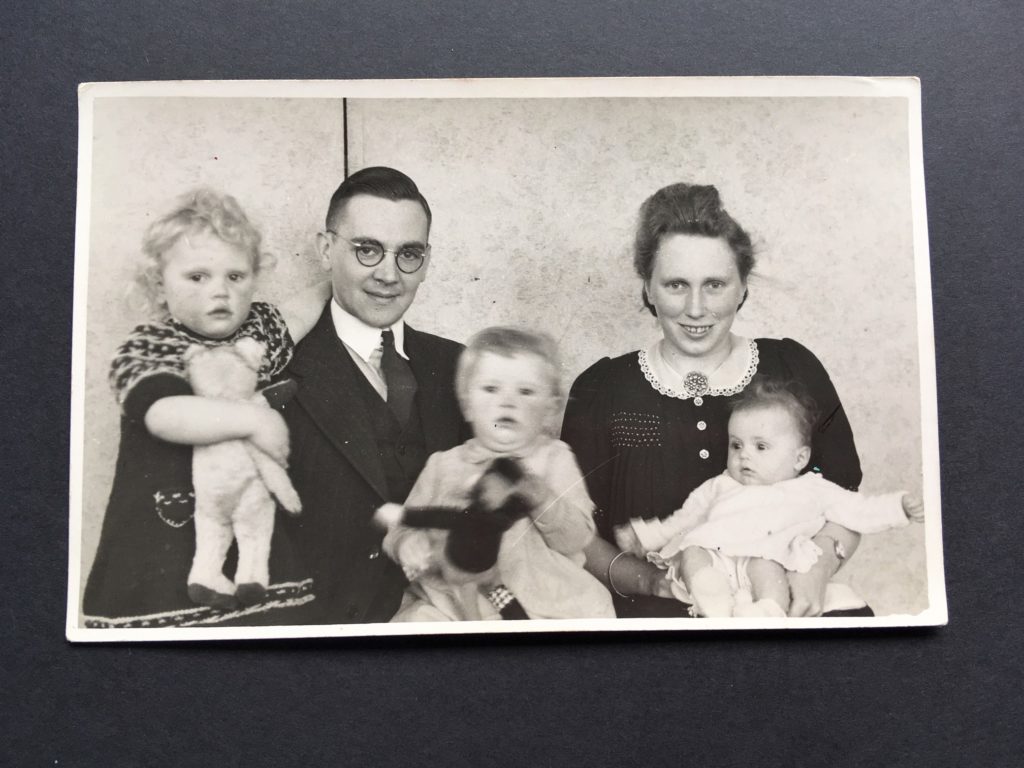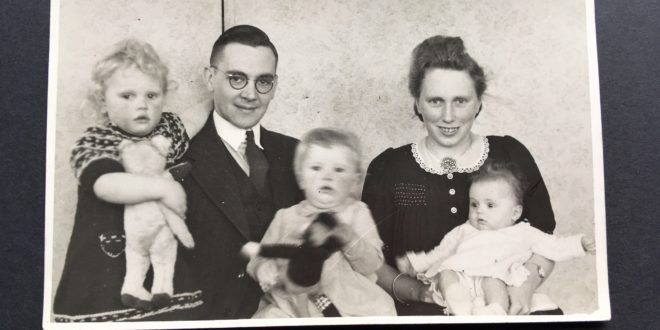This is Week 5 of Lyn Potter’s Lockdown Diary.
This week, due to the national lockdown, traditional dawn services could not be held, so we commemorated Anzac Day in a different way. I got up early and joined the shadowy figures standing in front of their letterboxes, each of us keeping to our own bubble. It was still dark and eerily quiet until at 6am some-one turned on their radio and the Last Post echoed down our street. We listened respectfully and remembered the fallen in all wars and especially the Australian and New Zealand soldiers at Gallipoli in 1915.
For many of us Anzac Day was also a day to remember war stories from our own families, of those who went to war and those who stayed behind.
And so, I told my granddaughters how their great grandparents, on their Dutch side, had to go into lockdown during World War 2. This is their story:

In 1940 my parents were a young married couple living with one toddler in a small apartment in Oegstgeest in the South of Holland. On the 10th of May that year my Mother, who was pregnant with her second child, was busy hanging out the washing when to her horror she saw hundreds of Germans parachuting down from the sky to land in the large tulip fields nearby. Germany was invading the Netherlands. Four days later the city of Rotterdam was bombed to smithereens and by late afternoon the Dutch had surrendered. The German military occupation would last until 1945.
When my Father’s boss at the University was arrested and taken to a concentration camp, he needed to find work elsewhere. He accepted a job as the Minister of a small parish in the village of Kubaard in the province of Friesland.
The church was deeply involved in the resistance movement, and a secret hideout had been created above the ceiling in the manse. Here my parents hid young men from the Germans so they would not be rounded up and taken to Labour Camps.
My parents always had fond memories of the way people in the village cared for and supported each other during this time, often at great risk to themselves. Lifelong friendships were forged. But there were also a few who sided with the Nazis and snooped around.
One day a German officer, accompanied by a Dutch Nazi sympathiser, came knocking at the door looking for my Father. Fortunately, he was away at a meeting. The German officer then threatened to arrest my Mother, but she persuaded him that her (by then) three small children could not be left on their own. When the Germans came back the following day she watched from the attic of a nearby house as they ransacked the manse. They stole everything, bedding, furniture and clothes. Returning home was not possible.
At first a local vet and their family who lived 35 km out of the village sheltered them. But that could only be a temporary arrangement as they had two young children of their own, and it did not feel safe.
And so, when my Mother’s Father invited them to stay with him for as long as was needed, they accepted his invitation. My Grandfather was running a retirement home and hospital for 200 residents not too far from Amsterdam.
Staying there was still risky as my grandfather was hiding Jews to save them from being sent to concentration camps. Several young Jewish girls were employed as staff and one elderly Jewish lady was being cared for. My father also heard on the grapevine that the Germans were still making enquiries as to his whereabouts. So, he could not go outside at all, but my Mother had a little more freedom.
They did not go hungry. The hospital had been designated as a Red Cross facility and a large Red Cross was painted on the roof. Farmers from surrounding areas would sometimes bring donations of meat, butter, potatoes and vegetables to help out. But the day to day diet was not very appetising. For breakfast it was wheat or barley with hot water, lunch was some bread or potatoes and dinner could be anything. What my father dreaded most of all was swedes mashed with curly Kale. No real coffee or tea either, they had to make do with substitutes.
Still they were very thankful they had food on the table. During the last winter before the war ended the Germans put a food blockade in place. Just a few kilometres away people were dying of hunger. Their bodies were piled up in church halls as funeral directors could not cope with the demand.
My parents’ lockdown lasted for 7 long months. It must have been really hard looking after three pre-schoolers (of whom I was the youngest) in their small living space.
When at last in May 1945 the Germans surrendered, my oldest sister, who was five, was so excited because it was the first time that the curtains in their room were allowed to be drawn and she could look out of the window.
After the war, it took time for my parents to get back on their feet but they went on to have many happy years together.
They rarely talked about their war experiences. It was not until my Father was in his seventies that he sat down with my oldest sister and recorded the story of his life, precious memories to pass on to future generations.
Reviews by Lyn Potter
Parent and grandparent, Avid traveler, writer & passionate home cook









Join the Discussion
Type out your comment here:
You must be logged in to post a comment.